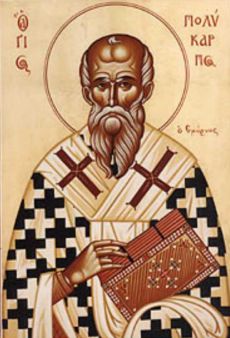Saint Polycarp of Smyrna
 Saint Polycarp is a celebrated figure in the history of Christianity, and one of the few martyrs from the first centuries who's story has been proven to be historically accurate. A direct pupil of the apostle John, Polycarp lived between 70 and 155 A.D., connecting him to both the biblical apostles and the early church fathers. Several ancient sources document the contributions of Polycarp to Christianity. These include his letters written to the church at Philippi, in which he encourages the members to remain strong in their faith and to flee from materialism and instructs the members in the proper handling of financial dishonesty, which was apparently an issue creeping into the church.
Saint Polycarp is a celebrated figure in the history of Christianity, and one of the few martyrs from the first centuries who's story has been proven to be historically accurate. A direct pupil of the apostle John, Polycarp lived between 70 and 155 A.D., connecting him to both the biblical apostles and the early church fathers. Several ancient sources document the contributions of Polycarp to Christianity. These include his letters written to the church at Philippi, in which he encourages the members to remain strong in their faith and to flee from materialism and instructs the members in the proper handling of financial dishonesty, which was apparently an issue creeping into the church.
Polycarp served as the bishop at Smyrna (in modern day Syria), and was recognized as one of the early combatants of Christian heresies, namely the Gnostics and the theologian Marcion.
Some argue that Polycarps greatest contribution to Christianity was his martyred death. His martyrdom is one of the most well documented events of antiquity. The emperors of Rome recorded many of the persecutions and deaths from this era that resulted from the widespread crackdown on Christianity, which was viewed as a dangerous cult that needed to be stopped.
At 86 years of age, Polycarp was arrested on the charge of being a Christian. Amidst an angry mob, the Roman proconsul took pity on the gentle old man and urged Polycarp to proclaim, "Caesar is Lord". If only Polycarp would make this declaration and offer a small pinch of incense to Caesar's statue he would escape torture and death.
To this Polycarp responded, "Eighty-six years I have served Christ, and He never did me any wrong. How can I blaspheme my King who saved me?" Steadfast in his stand for Christ, Polycarp refused to compromise his beliefs, and was burned alive at the stake. The date of Polycarp's death is disputed. The historian Eusebius dates it to the reign of Marcus Aurelius, circa 166 – 167. However, a post-Eusebian addition to the Martyrdom of Polycarp dates his death to Saturday, February 23 in the proconsulship of Statius Quadratus—which works out to be 155 or 156. These earlier dates better fit the tradition of his association with Ignatius and John the Evangelist.
3 comments:
It amazes me how long people lived back then.
Think about it: the Apostle John is said to have died in 101 AD. If he was a fisherman when he met Christ (who I think died around 33 AD or thereabouts) then he was probably at least 14 when Christ died. That means that John was at least 75 years old upon his death!
Furthermore, Saint Polycarp lived for 86 years! I wonder what the retirement age was back then...
86 if we assume he was baptized a christian at birth or raised as such. He could have been older.
i bet he's frowny in that picture because his name is polycarp.
Post a Comment